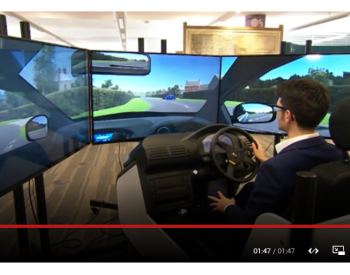XPI Simulation Featured on BBC News
XPI Simulation, the driving simulation arm of Thales Training Solutions, has been featured in a BBC regional news video that describes OmniCAV - a project that could revolutionise connected autonomous vehicles (CAV) testing and certification.
XPI is a key partner in OmniCAV– a £3.9m project co-funded by the UK Centre for Connected and Autonomous Vehicles (CCAV). This collaborative research project involves ten partners, and will create a virtual testing and certification environment to accelerate the global development of CAVs.
The BBC piece, which features Ordnance Survey (OS) and Latent Logic (the overall project lead), explains how mobile mapping is being used by OS to capture data for the creation of a digital twin of a 32km road-loop in Oxfordshire. A LiDAR scan of the chosen route will be combined with road-level and airborne imagery in order to create a 3D model of the road network.
Click here to see the video.
XPI’s driving simulation software will use this digital twin as a virtual proving ground, where a number of scenarios (created by Warwick University) will be deployed to test the behaviour of autonomous vehicle software that is being developed by Arrival. The scenarios will draw upon data from Admiral on the types of collisions that are currently experienced by human drivers.
This simulation-based approach enables testing to be carried out more quickly, safely and with greater control and repeatability than on-road or track-based testing. Using simulation also permits the parameters of the scenario to be adjusted to ensure that all eventualities – different vehicle positions, vehicle speeds, road layouts, weather etc. – can be evaluated, exposing edge cases where a combination of conditions might cause a vehicle to behave inappropriately.
XPI will integrate Aimsun traffic modelling software to provide background pattern of life around the CAV under test, while Latent Logic will provide AI-trained smart actors to represent highly-realistic driver and pedestrian behaviours.
XPI is reaching the conclusion of the overall system architecture design phase, and will shortly be commencing development and integration of the simulation software. The overall synthetic environment is due to be made available to Arrival for initial testing in Q2 2020. Arrival will then put their autonomous vehicle through testing in the simulator, proving ground tests (at RACE, part of the UK Atomic Energy Authority) and on-road trialling in Oxfordshire. OmniCAV is due to conclude in November 2020.
About OmniCAV
OmniCAV is a UK government-funded cross-industry collaboration to create a virtual testing and certification environment to accelerate the global development of Connected and Autonomous Vehicles (CAV). The ‘digital twin’ will represent a 32km road-loop in Oxfordshire, which includes urban, peri-urban, and rural roads and a varied range of road layouts. The partners in the project are: Latent Logic (lead), Admiral, Aimsun, Arcadis, Arrival, Ordnance Survey, Oxfordshire County Council, UK Atomic Energy Authority, WMG (at the University of Warwick), and XPI Simulation. Thatcham Research is providing advice as a non-funded partner. For more information on OmniCAV see their website here.
OmniCAV is part-funded by the Centre for Connected and Autonomous Vehicles (CCAV), delivered in partnership with Innovate UK. It is part of the government’s £100 million Intelligent Mobility Fund, supporting the Future of Mobility Grand Challenge.
More News
Get in Touch
Ask an XPI Simulation expert to help using our simple form. We understand that each customer has different budget and performance requirements, so we work with our customers to offer a complete range of systems that are fully scalable and flexible to meet their specific needs.



